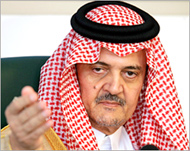Middle East split over Iraq deepens
Iranian Foreign Minister Manouchehr Mottaki has put off a planned visit to Saudi Arabia after the two countries publicly clashed over the situation in Iraq.

Sunni-ruled Saudi Arabia has accused Shia Iran of meddling in the affairs of the violence-ravaged country, but Tehran has denied the charge, which also drew a scathing attack on Saudi Arabia from an Iraqi Shia minister.
The surprise postponement of Mottaki’s visit on Wednesday was reported by Saudi Foreign Ministry sources although Iranian officials could not be reached for comment.
Mottaki had proposed delaying his visit by a day to Thursday, one source told reporters, but Saudi officials chose to put off the visit to a later date.
“Iraqis are complaining of interference by Iran. If there is indeed such interference, especially in provinces neighbouring Iran, that would be quite serious,” Saudi Foreign Minister Prince Saud al-Faisal said last month.
The alleged interference “includes the entry of people, money and weapons as well as meddling in political life,” he said.
Shia influence
His remarks reflected Riyadh’s concern that Iran could increase its influence in Iraq, where it already enjoys sympathy among the ruling majority Shia community, while the once-dominant Sunnis feel marginalised.
|
“Saudis should first allow women to drive, as is the case in Iraq” Bayan Baqer Sulagh, |
Saud has also charged that Washington was effectively handing Iraq to Iran by pursuing a policy that deepened sectarian divisions. Tehran dismissed Riyadh’s concerns.
“The Islamic Republic of Iran does not expect such remarks from its friends at such a sensitive time in the region, and considers them surprising and irrational,” Foreign Ministry spokesman Hamid Reza Asefi said last month.
Saud’s comments also drew a harsh attack from Iraq’s interior minister, who said Iraqis would “not accept a Bedouin on a camel teaching us about human rights and democracy.”
Second class citizens
Interior Minister Bayan Baqer Sulagh said the oil-rich Sunni-ruled kingdom had several problems of its own to take care of. “Saudis should first allow women to drive, as is the case in Iraq,” he said, adding that “four million Shia live like second-class citizens in the Saudi kingdom.”
Commenting on the outburst, an Emirati newspaper said on Wednesday that the Iraqi interior minister could do with some lessons of his own.
“Sulagh says the new ‘democratic Iraq’ would not accept lessons from others. But surely the minister needs to learn how to speak,” Gulf News wrote.
Sulagh’s “racist, and equally silly, statement has reminded us of the outrageous rhetoric of the the former Baathist regime,” the paper said.
Bedouin heritage
In any event, “our Bedouin heritage is a source of pride, not of shame,” being “synonymous with courage, generosity and honesty,” it added.
Saudi daily Al-Yom, implicitly referring to Sulagh, said Riyadh would continue to try to help the Iraqi people and would not be provoked by those who had “failed to defend themselves and their people”.
 |
|
Al-Faisal accused Iran of |
Mottaki had been due to visit Saudi Arabia from Oman, after he visited Kuwait and Bahrain on his first tour of Gulf Arab states since he assumed office in August after the election of hardline Iranian President Mahmoud Ahmadinejad.
Saudi Arabia on Sunday hosted a meeting of an Arab ministerial committee on Iraq which decided to send Arab League secretary-general Amr Mussa to Baghdad soon to organise a reconciliation conference of all factions, the first such Arab initiative since the US-led invasion of Iraq in March 2003.
The decision came amid growing tensions in Iraq over a draft constitution due to be put to a referendum on 15 October despite Sunni objections to the charter.